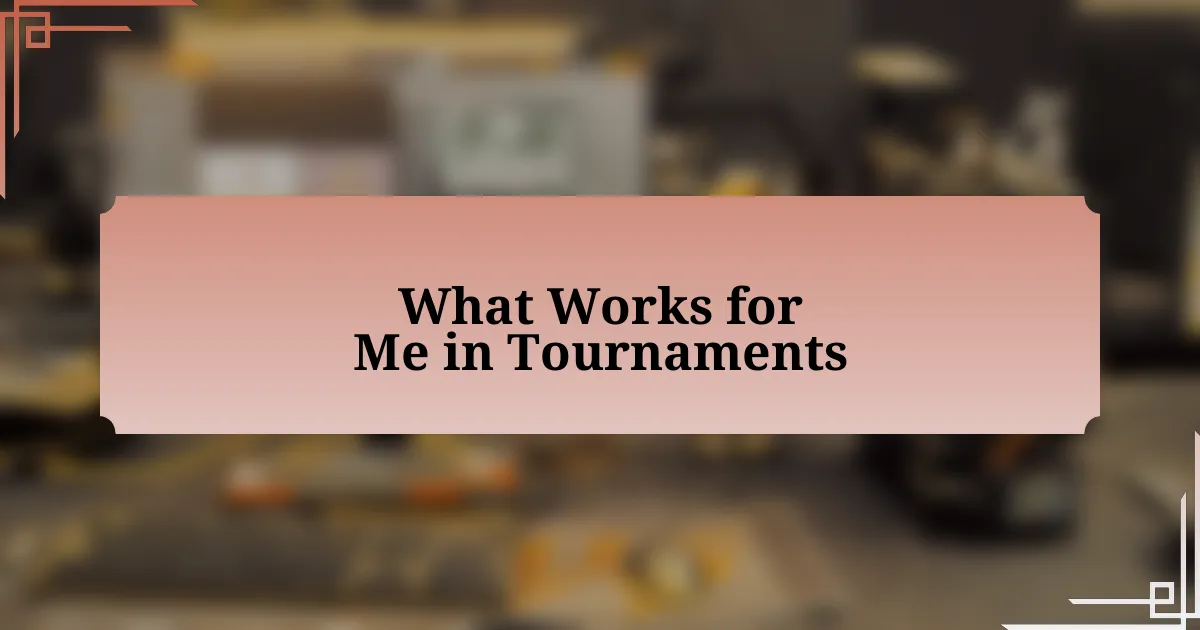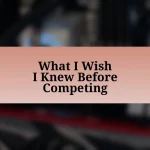Key takeaways:
- eSports tournaments can range from local gatherings to international events, highlighting the importance of structure, organization, and skill under pressure.
- Strategy plays a crucial role in eSports success, requiring synergy among teammates and adaptability to changing game dynamics.
- Key skills for tournament success include effective communication, maintaining composure under pressure, and proper time management.
- Mental preparation techniques, such as visualization and mindfulness, significantly enhance performance in high-pressure situations.
Author: Evelyn Hartley
Bio: Evelyn Hartley is an award-winning author known for her compelling narratives and richly drawn characters. With a background in psychology and literature, she weaves intricate tales that explore the complexities of human relationships and the intricacies of the human psyche. Her debut novel, “Whispers in the Dark,” was celebrated by critics and readers alike, earning her a dedicated following. Evelyn’s work has been featured in various literary journals and anthologies, and she frequently speaks at writing conferences and workshops. When she’s not writing, she enjoys hiking in the mountains and volunteering at her local animal shelter. She resides in Seattle with her two rescue dogs, Luna and Milo.
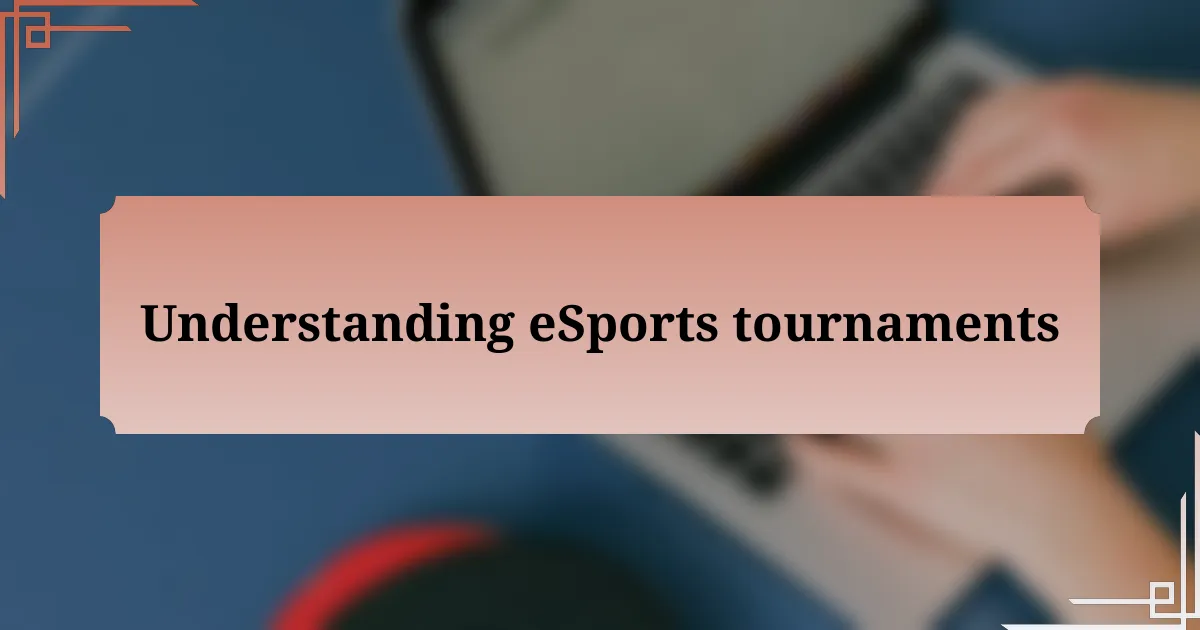
Understanding eSports tournaments
When diving into eSports tournaments, it’s fascinating to see how they can range from small local gatherings to massive international spectacles. I remember attending a local tournament where the energy in the room was palpable; it reminded me of my own passion for competition. Watching players showcasing their skills live as the crowd cheered them on was an unforgettable experience.
Understanding these tournaments extends beyond just gameplay; it involves grasping the structure and organization. Often, tournaments are set up in brackets, where each match is crucial for advancing to the next round. Have you ever thought about the pressure players feel in elimination rounds? From my experience, this intensity can ignite a drive that elevates their skills to new heights, pushing them to perform beyond their usual capabilities.
Furthermore, the prize pools can vary significantly, often reflecting the popularity of the game and the sponsors involved. I can recall a tournament where the prize money was substantial enough to attract top-tier talent, and the level of play was astonishing. It made me realize how much these events serve as both a proving ground and a celebration of talent in the gaming community.
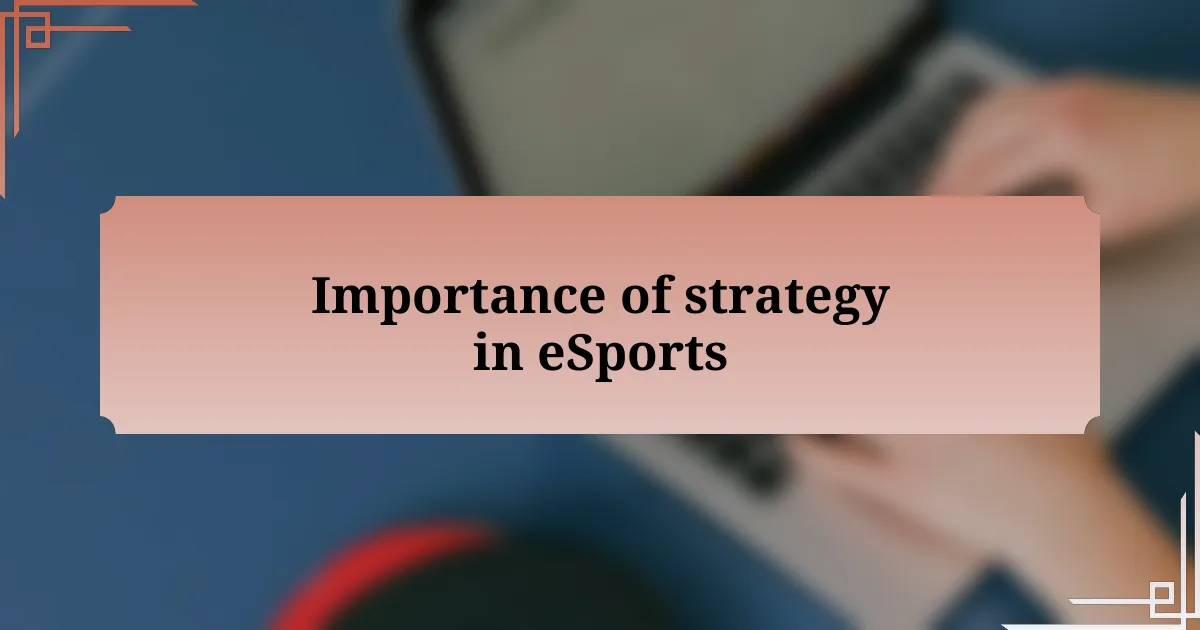
Importance of strategy in eSports
Strategy is the backbone of success in eSports, serving as the blueprint for victory in every match. I’ve seen firsthand how a well-thought-out strategy can transform a game; during a tournament I participated in, our team spent hours developing strategies around team compositions and counterplays. With each match, I felt the tension of executing our game plan, and when it worked, the thrill was incredible.
What strikes me is how strategy isn’t just about individual skill but about synergy among teammates. There have been moments when the coordination within my team led to unexpected victories against seemingly stronger opponents. Isn’t it fascinating how a harmonious approach can turn the tide of a match? These shared strategies build trust, helping teams make split-second decisions during intense gameplay.
Ultimately, adapting your strategy to the changing dynamics of the game is crucial. I often found myself reassessing our approach mid-tournament when the competition introduced new tactics. It took a high level of awareness and flexibility, but those moments taught me that strategy is not just a plan—it’s a living, breathing element of gameplay that evolves with each challenge.
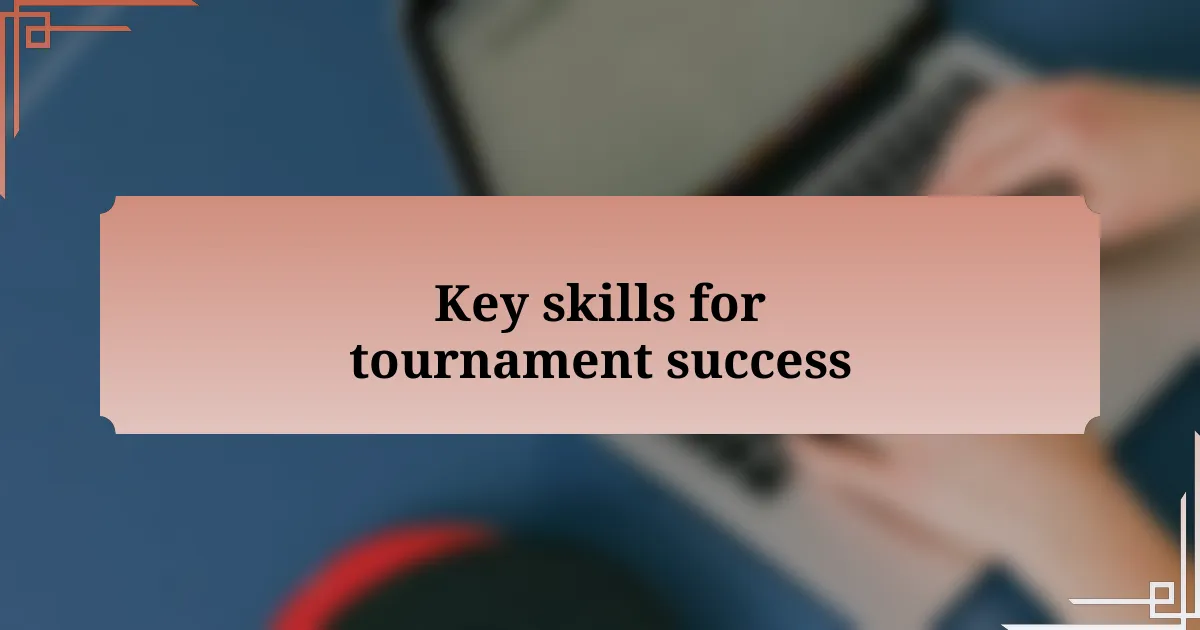
Key skills for tournament success
Mastering communication is one of the key skills for success in any eSports tournament. I remember a time during a particularly intense match when miscommunication almost cost us a round. It was a sharp wake-up call; we learned the value of clear calls and signals. In my experience, syncing up with teammates—whether it’s through voice chat or quick pings—can make the difference between victory and defeat, especially when the heat is on.
Another critical element is the ability to stay calm under pressure. I recall facing a team known for their aggression; every moment was intense, and the stakes were high. Keeping a level head during those frenetic moments allowed me to make better decisions and enjoy the gameplay despite the chaos. How do you maintain that sense of calm? I’ve found that focusing on my breathing and reminding myself of our plan helps me stay centered and effective.
Lastly, mastering time management within tournaments is essential. Balancing practice schedules with mental and physical wellness can significantly impact performance. I vividly remember almost burning out before a major event because I pushed myself too hard. Understanding when to grind and when to step back for self-care was a game-changer for me, leading not just to better gameplay but also to a healthier mindset.
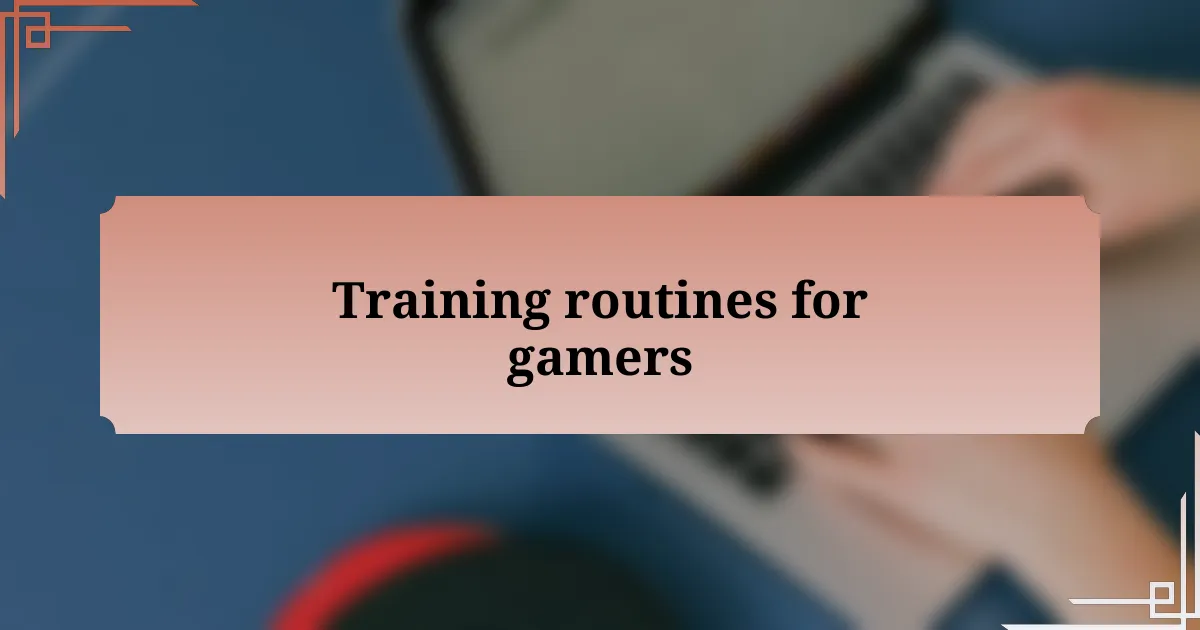
Training routines for gamers
Building a training routine as a gamer demands not only consistency but also the right focus. I remember setting aside specific hours of the day dedicated solely to practice, which allowed me to build muscle memory and hone my skills efficiently. Have you ever set a schedule only to find yourself distracted? I’ve realized that prioritizing those training sessions was crucial, even if it meant saying no to other activities.
Incorporating variety into my training has been key for maintaining motivation. During one particularly challenging week, I decided to switch up my routine by including different gameplay modes and genres. This not only reinforced my core skills but also kept the experience fresh and engaging. I think it’s essential to ask ourselves: How can we make practice enjoyable? For me, mixing in games that challenge my reflexes alongside team strategy games kept my overall skills sharp.
Lastly, integrating physical exercise has dramatically improved my gaming performance. I can still recall the days I would sit for hours, but incorporating simple stretching or cardio workouts made me feel more energized and focused. It’s a common challenge to overlook this aspect, but I found that taking even a short break to move around led to clearer thinking and better in-game decision-making. What small changes can you make to boost your physical game?
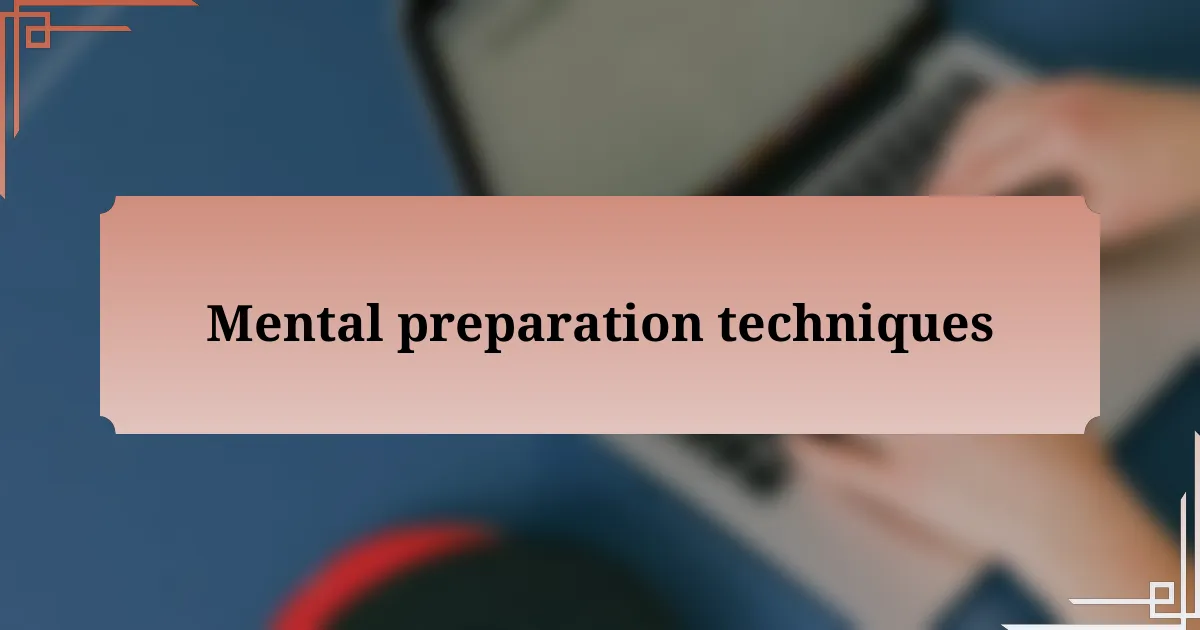
Mental preparation techniques
Mental preparation has played a pivotal role in my tournament performance. Before stepping onto the stage, I would often engage in visualization techniques. I vividly imagine each match, picturing the moves I intend to make and the possible scenarios. This mental rehearsal not only calmed my nerves but also boosted my confidence. Have you ever tried visualizing your success? It can be a game-changer.
Another technique I found effective is mindfulness meditation. I remember feeling overwhelmed with anxiety before a major tournament, so I began dedicating just ten minutes a day to mindfulness. Focusing on my breath helped center my thoughts and clear the mental clutter. It’s remarkable how just a few moments of quiet can help me regain composure and sharpen my focus. What if you set aside time each day to find that mental clarity?
Finally, affirmations have proven more powerful than I initially believed. At first, I felt a bit silly repeating positive statements, but they gradually shifted my mindset. Whenever doubt crept in, I would remind myself of my abilities and past successes. It’s fascinating how those simple phrases can reframe your perspective, isn’t it? Embracing this practice has made a tangible difference in my approach to competition.
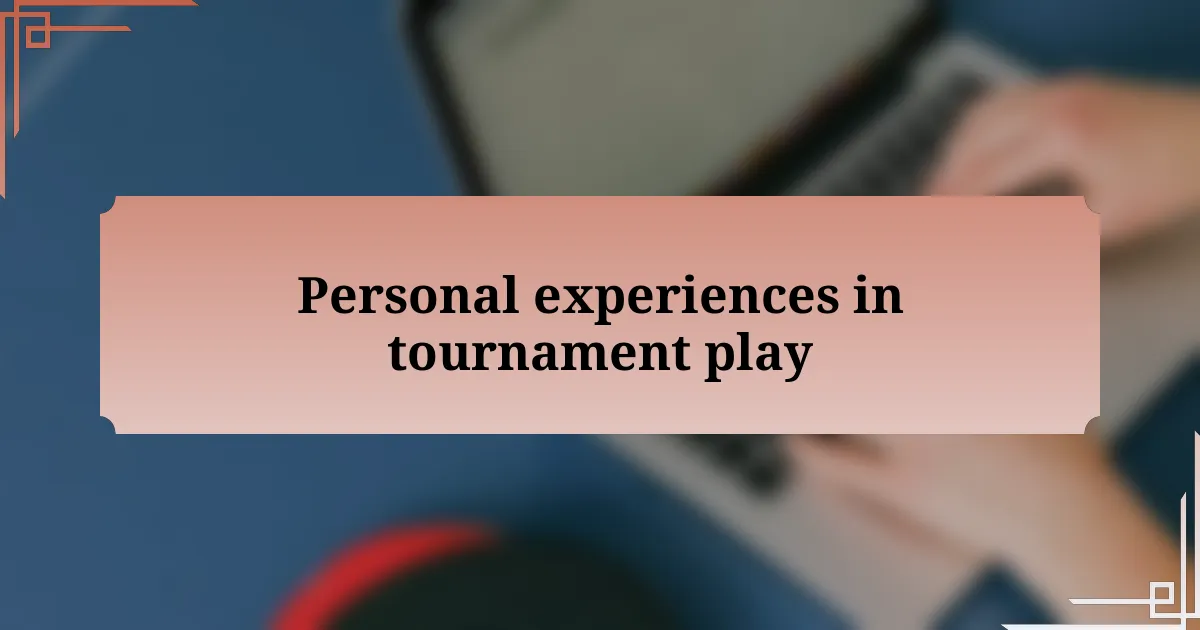
Personal experiences in tournament play
Tournament experiences can be both exhilarating and nerve-wracking. I recall a time during a crucial match where everything seemed to hinge on a single decision. As the timer ticked down, I felt this rush of adrenaline that sharpened my focus. Suddenly, I knew what move to make—it was instinctual. Have you ever felt that electric moment of clarity in high-pressure situations?
Preparation can also mold your tournament flow. There was a specific tournament where I realized that my gameplay often faltered when I didn’t warm up properly. One day, I dedicated an hour to practice beforehand, and it made all the difference. My performance was smoother, and I felt more in sync with my team. It’s intriguing how a little preparation can transform the way we play under pressure, isn’t it?
What stands out most in my tournament journey is the camaraderie forged with teammates. I remember celebrating small victories and leaning on each other during defeats. That shared experience created bonds that extended beyond the game itself. When connections deepen, doesn’t it amplify the excitement of competing?
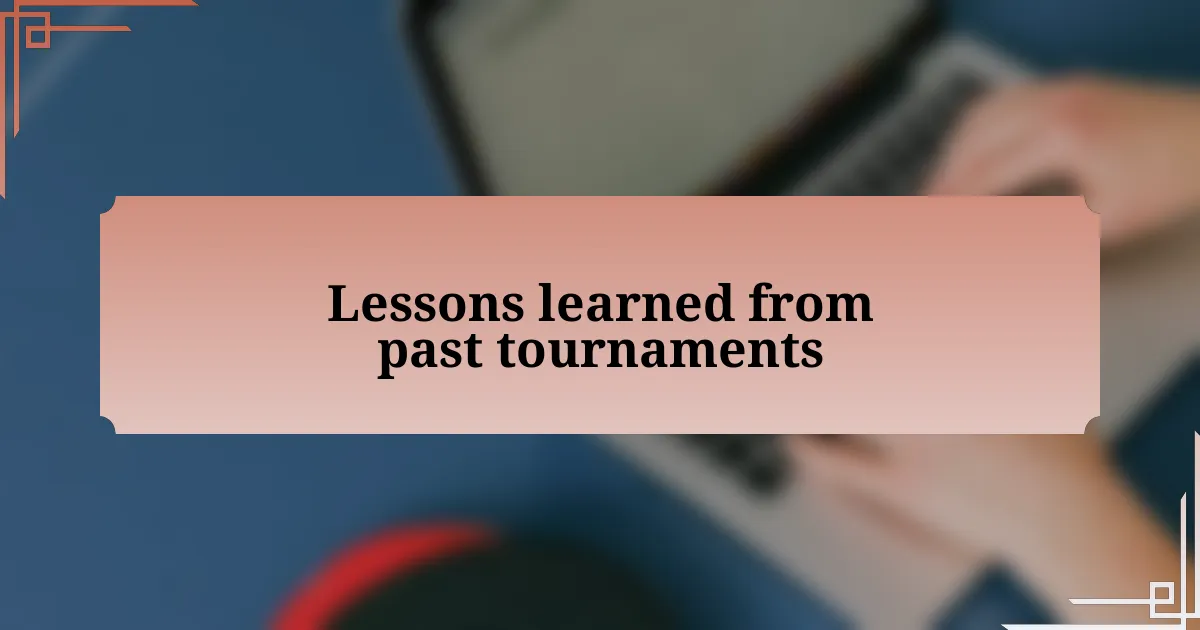
Lessons learned from past tournaments
In my past tournament experiences, one key lesson I’ve learned is the importance of adaptability. There was a match where my team’s original strategy crumbled under unexpected pressure from the opposing team. In that chaotic moment, I realized that being flexible with our tactics made all the difference. Sometimes, you have to pivot quickly to secure a win; have you experienced that need to change plans on the fly?
Another revelation came from understanding the mental side of competitive gaming. I once underestimated the toll that nerves could take. In one tournament, I found myself completely losing focus after a series of mistakes. It was a wake-up call, teaching me that mental resilience is just as crucial as technical skill. Sometimes, it’s not just about how good you are at the game, but how you handle the game within your own mind, right?
Lastly, I’ve come to appreciate the value of post-match reflection. After a particularly intense tournament, where our team placed lower than we hoped, I took the time to analyze not just the gameplay but also our communication. We discovered that minor misunderstandings had significant impacts. By discussing these moments, we improved as a team, ensuring that future tournaments would benefit from our newfound clarity. Isn’t it interesting how reflecting on our failures can pave the path to success?

